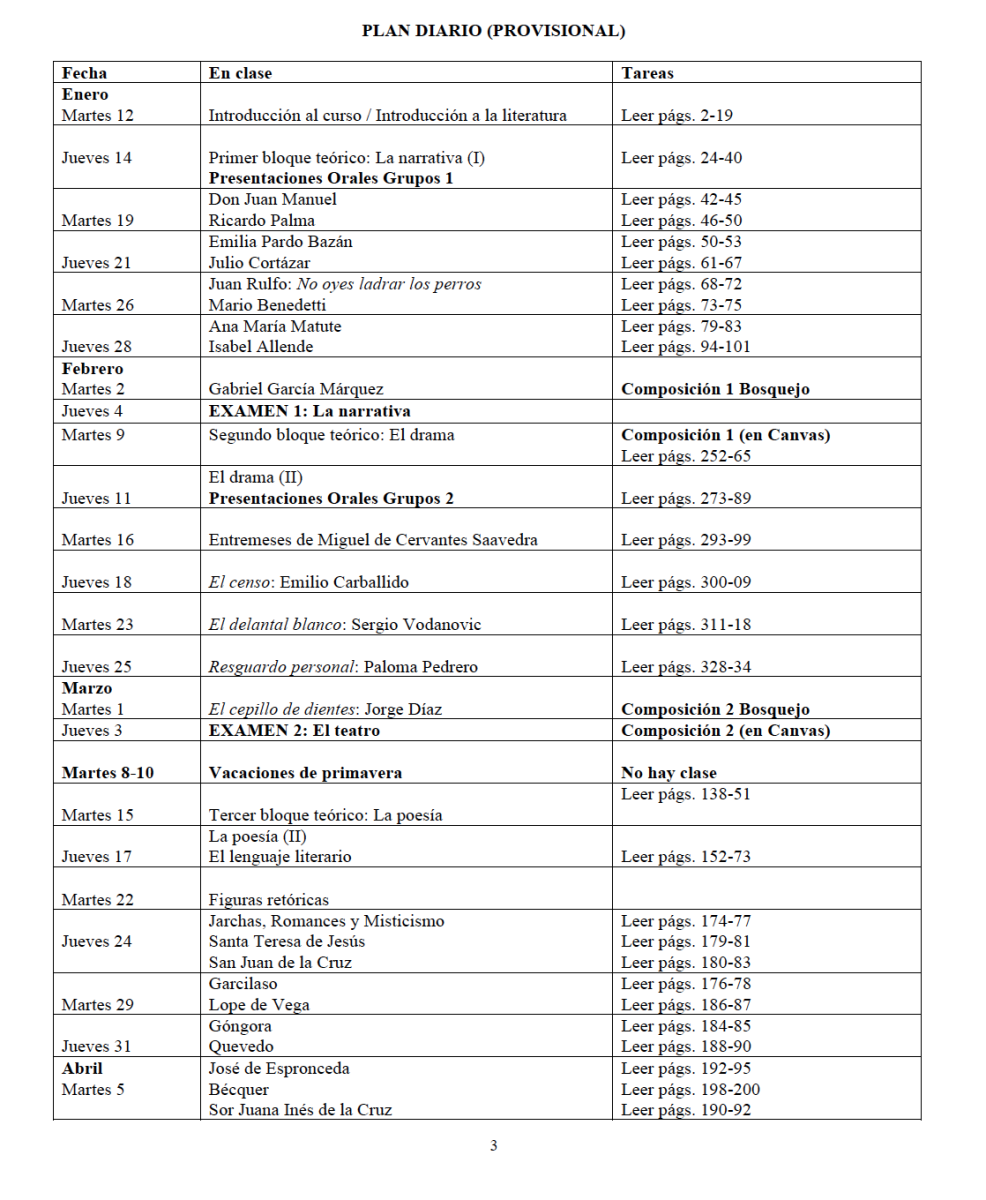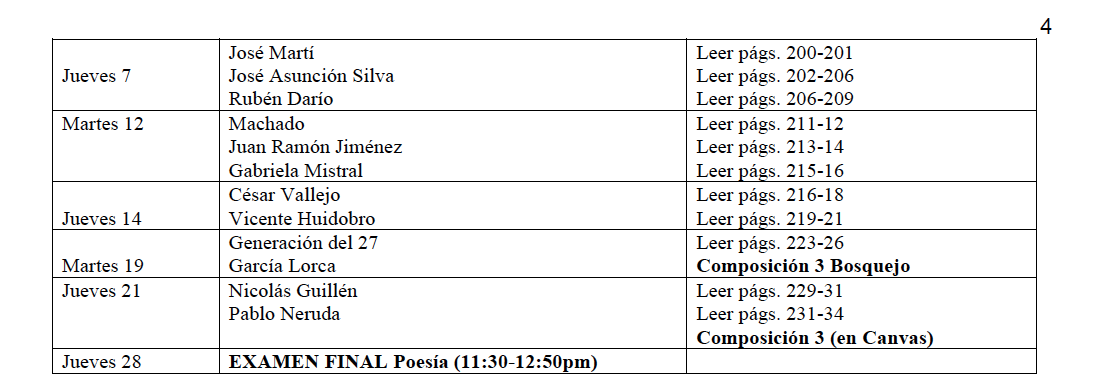SPAN 3160 Intro to Lit
SPAN 3160: Introducción a la literatura
Weber State University, Spring 2016
Elizabeth Hall 118
TR 10:30-11:45 AM
Professor: Dr. Diego R. Batista
Office: 425 Elizabeth Hall, 626-6986
Email: diegobatistarey@weber.edu
Office hours: MW 9:30-11:20; or by appointment
TEXT: Aproximaciones al estudio de la literatura hispánica. Friedman, Edward, et al., McGraw-Hill: Boston, 7th edition, 2012.
Recommended Text: An excellent Spanish dictionary. Smaller paperback dictionaries usually help with spelling but don’t provide sufficient background on language usage. Please, purchase a hardbound dictionary that you will use for years to come. Among the better dictionaries are: Vox and the Larousse Concise Dictionary.
Objectives: In this course, students will read and discuss representative works from three major genres: narrative, poetry, and theater. The purpose of the Introduction to Literature course is to provide students in Spanish with a basic background for reading both Hispanic literary production and culture and will focus on the development of a method for reading critically. Students will learn how to identify and discuss: themes, plots and structure, and poetic tropes such as symbols, metaphors, and allegory. For all practical purposes, the readings will be presented through a basic theoretical approach suitable to understanding literature as a product and producer of a legible cultural matrix. By understanding this cultural matrix, students will be better prepared for both interaction with literary/cultural texts as well as interaction in any cultural space where Spanish is spoken.
Students will be expected to do the following (OUTCOMES):
1. Read critically and use concepts learned in class to analyze literary texts orally (both individually and in groups);
2. Distinguish literary genres from one another by writing short responses in the target language that incorporate vocabulary and terminology from our classroom discussions; students will also incorporate in their responses (including oral presentations) precise terminology of literary criticism using examples of these terms in literary texts as aids in understanding the interplay between themes and forms.

Participation in class discussions (15%): All students will have the opportunity and the responsibility to participate in class on a regular basis. At random, students will be given the opportunity to respond to an aspect of the theme that the class is discussing. The professor will take notes regarding the relevancy of the response. Willingness to participate, preparedness and creativity will be rewarded at the beginning, but expectations will rise as students become conversant in the material and approach. Students who do not or cannot attend class are unable to participate. They will automatically receive a 0 for that day’s discussion/activity. Students must attend and arrive on time for all meetings.
* Missing a class: if you miss a class, you will be responsible for learning what was covered during your absence, as well as finding out whether there is an assignment to turn in or to do for the next class. For this reason, please write down the name, e-mail, and phone number of a couple of classmates for you to contact if necessary.
Name Phone number E-mail
__________________________________________________________________________________________
__________________________________________________________________________________________
Oral presentations (10%): Each student will participate in at least two oral presentations during the semester: one individual and one group presentation. The individual presentation (5 mins.) should be based on secondary material that informs about an author’s influences, aesthetics, or critical perspectives on his/her work. Research, coherence and the presentation itself will be graded. More information about the group presentation will be given later in the semester.
Exams (30%): There will be two essay exams in this course. The topics will require sufficient time to reflect and develop well-thought out and organized answers. Students must use the theoretical concepts discussed in class to compare, contrast and analyze the specific theme and illustrate their responses with sufficient examples. The exams are evaluated by criterion reference standards. This means that there is no curve.
Papers (20%): Students will be required to write two essays during the semester at the end of the narrative and poetry sections. The due dates are indicated in the class calendar. The general rule is, "never turn in a paper without running the spell check!" You will bring to class a hard copy of your rough draft to receive feedback from your peers. The final essays will be handed in electronically through Canvas. I will not accept hand-written essays or late essays. Each essay will focus on one of the literary works studied up to that point. Its content will comprise an analysis or reflection on that literary work of your choice, not a summary of the primary text. You may research other sources to document your work, in which case you will need to include a separate page of “Works Cited.” The essay needs to provide specific examples from the primary text to support your thesis; it needs to be clearly written in Spanish and to be grammatically correct. Guidelines about the writing of literary essays will be provided in class. I encourage you to start thinking about your essays as soon as we begin the class readings.
Quizzes (10%): There will be quizzes from time to time throughout the semester. These may be announced or they may not be. They may include questions about the reading materials and/or the in-class discussions. Quizzes may not be made up due to absence or tardiness.
General Policies
Electronic devices
Electronic devices may be used in this class ONLY for activities related to COURSE CONTENT. They should absolutely NOT be used for text messaging, Facebook, etc.
Academic honesty
It is expected that students will submit their own work. A complete description of cheating and plagiarism can be found in the WSU Student Code (Section IV, Part D, Paragraph 2). Plagiarism will result in failure on an assignment or in the course, depending on its severity. On the other hand, students are encouraged to collaborate on assignments and to have others read their work and give comments and suggestions before turning work in.
Students with Disabilities
When students seek accommodation in a regularly scheduled course, they have the responsibility to make such requests at the Center for Students with Disabilities (tel. 626-6413) before the beginning of the semester in which the accommodation is being requested. When a student fails to make such arrangements, interim accommodations can be made by the instructor, pending the determination of the request for a permanent accommodation.
Emergency Closure
If for any reason the university is forced to close for an extended period of time, we will conduct our class via e-mail and through Weber online. Look for announcements on your Weber State email account and at online.weber.edu.
Core Beliefs
Students are to determine, before the last day to drop courses without penalty, if any course requirements conflict with their core beliefs. If there is such a conflict, the student should consider dropping the class. A student who finds this solution impracticable may request a resolution from the instructor. This policy does not oblige the instructor to grant the request, except in those cases when a denial would be arbitrary and capricious or illegal. This request must be made to the instructor in writing and the student must deliver a copy of the request to the office of the department head. The student's request must articulate the burden the requirement would place on the student's beliefs.
The Department of Foreign Languages requires a final portfolio from all graduating majors during the last semester of their senior year. If you are a major or a minor, or are even considering becoming a foreign language major, please save (on computer disk, if possible) at least one example of your best work from this class and all other language classes you take towards fulfillment of your major.


